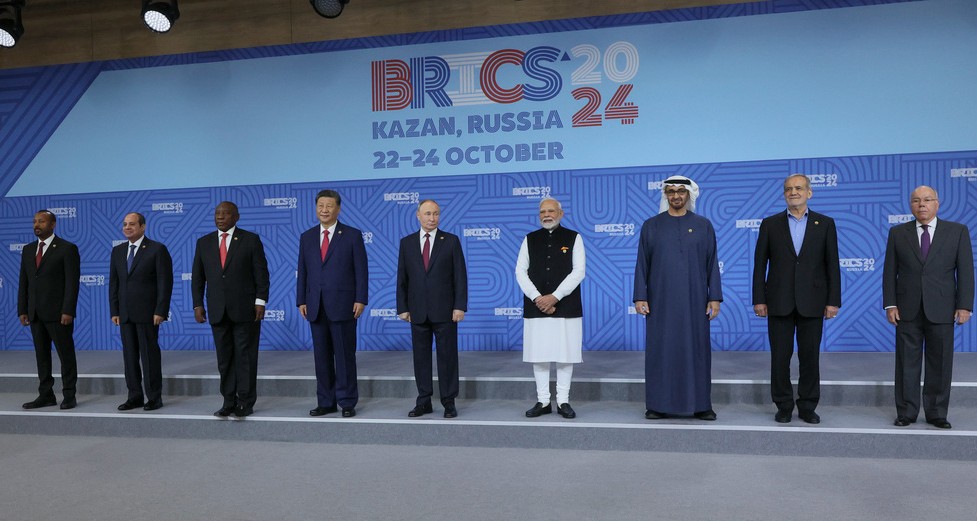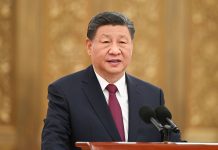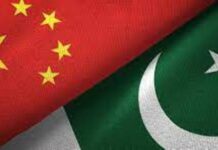BEIJING: President Xi Jinping’s recent visit to Russia to attend the 16th BRICS Summit provides a fresh outlook on how China effectively responds to the changing global landscape, reflects the common will of the Global South countries, and follows up on China’s commitment to advancing cooperation with developing nations, said officials and experts.
The trip to Russia’s Kazan from Tuesday to Thursday marked Xi’s first overseas visit after the third plenary session of the 20th Central Committee of the Communist Party of China, and it is also the first BRICS summit after the grouping’s historic membership expansion in January.
In less than 48 hours in Kazan, Xi attended a series of multilateral and bilateral events in a packed schedule.
Xi’s visit to Russia “opens a new phase of greater BRICS cooperation, builds a new consensus for unity and revitalization of the Global South”, and sets a fresh example of head-of-state diplomacy, said Foreign Minister Wang Yi.
“The greater BRICS cooperation is leading the unity of the Global South and is having an important and far-reaching historical influence,” Wang told journalists as the visit concluded.
During the summit, Xi called on member countries to endeavor to build a BRICS of peace, innovation, green development, justice and greater people-to-people exchanges.
In his speech, Xi announced China’s eight practical measures to support the high-quality development of BRICS cooperation, such as building a BRICS Digital Ecosystem Cooperation Network. Wang said these measures “have further expanded the breadth and depth of BRICS cooperation, strengthened its pillars, improved its quality and upgraded it”, as well as enhanced self-confidence and self-reliance of the BRICS countries.
Michael Dunford, emeritus professor at the University of Sussex, said that Xi’s speech covered many things and also had “some strong messages”.
“Trade, the diffusion of green, digital and other technologies, and international cooperation can serve as instruments of development and fairness in a shared world,” he said. Currently, the Global South accounts for more than 40 percent of the world economy.
Leaders of more than 30 countries gathered in Kazan for the BRICS Plus leaders’ dialogue to express their views on strengthening multilateralism and promoting fair global development and security.
During the dialogue, Xi announced cooperation initiatives to be led by China, such as building a BRICS Customs Center of Excellence.
Foreign Minister Wang said that Xi has been “responding to the common aspirations of the Global South for unity, development and change, and demonstrating once again that China has never engaged in just empty words, but in real actions”.
Mehmood Ul Hassan Khan, president of the Pak-China Corridor of Knowledge and executive director of the Center for South Asia & International Studies, said, “Xi’s emphasis on justice, reforming global governance and multilateralism would lead to shared benefits.”
He added, “Principles of fairness, justice, openness and inclusiveness are the true principles of global governance.”
The BRICS member countries currently account for nearly half of the global population, contributing more than 50 percent to the world’s economic growth. The summit reached a consensus on inviting a new group of countries to become BRICS partner countries.
Atul Dalakoti, executive director of the Federation of Indian Chambers of Commerce and Industry, noted that Xi, in his speech, welcomed new members to the BRICS family and hoped that all the BRICS countries can work together for peace and security.
“It is a speech that outlines the future of the BRICS as a most important initiative of the Global South, and talks of a future of a multipolar world where the interests of developing countries will be protected,” he said.
During the summit in Kazan, Xi also held bilateral meetings with a number of foreign leaders, including Indian Prime Minister Narendra Modi, marking the first official meeting between the two leaders in five years.
“The restart of China-India relations from Kazan will not only benefit the 2.8 billion people of China and India, but also make due contribution to facilitating peace and prosperity in the region and the world,” said Wang, the minister. –The Daily Mail-CGTN news exchange item





